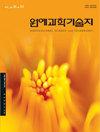利用叶绿体InDel标记鉴别柠檬与其他柑橘类群
IF 0.8
4区 农林科学
Q3 HORTICULTURE
Korean Journal of Horticultural Science & Technology
Pub Date : 2021-10-01
DOI:10.7235/HORT.20210057
引用次数: 0
摘要
柠檬(Citrus limon)是酸橙和香橼的种间杂交种,与三叶橙一起被广泛用作砧木。尽管柠檬在全年种子发芽率方面优于三叶橙,但使用柠檬作为砧木的障碍之一是缺乏可靠的柠檬特异性分子标记来区分微嫁接接穗和柠檬砧木的芽。为了获得柠檬特异性分子标记,我们比较了柠檬、柚子、甜橙和柑橘四种柑橘的全质体基因组,并开发了7个质体插入/缺失(InDel)标记。将叶绿体InDel标记应用于46个柑桔品系,包括柠檬(17个品系)、柚子、柑桔、蜜柚、酸橙、柑桔、木瓜、丹哥和丹哥组。结果表明,柑橘的树状图可以明显地划分为7个簇。柠檬形成一个单独的簇,在所有调查的材料中,每个InDel位点的等位基因大小相同。该InDel标记可为柑桔脱毒生产过程中对微嫁接接穗和柠檬砧木进行快速、清晰的鉴别提供有用的分子工具。具有母系遗传特征的质体InDel标记也可用于分析包括柠檬在内的柑橘品种的系统发育起源。附加关键词:柠檬,基因分型,母系遗传,细胞器基因组,砧木,接穗本文章由计算机程序翻译,如有差异,请以英文原文为准。
Development of Plastid InDel Markers to Discriminate Lemons from Other Citrus Groups
Lemon (Citrus limon), an interspecific hybrid between sour orange and citron, has been widely used as a rootstock along with trifoliate orange. Though lemons are superior to trifoliate orange in terms of their high seed germination rate throughout the year, one of the obstacles to using lemons as rootstocks is the lack of reliable, lemon-specific molecular markers to discriminate buds of the micro-grafted scion from those of the lemon rootstock. In order to obtain lemon-specific molecular markers, we compared the whole-plastid genomes available from four citrus species (lemon, pummelo, sweet orange, and mandarin) and developed seven plastid insertion/deletion (InDel) markers. The plastid InDel markers were applied to 46 citrus accessions that included lemons (17 accessions), grapefruit, mandarin, pummelo, sour orange, orange, papeda, tangor, and tangelo groups. The resulting dendrogram revealed that the citrus accessions used in this analysis could be distinctly classified into seven clusters. Lemons formed a separate cluster and had identical allele sizes for each InDel locus among all accessions investigated. This set of InDel markers could be a useful molecular tool for the rapid and clear discrimination of micro-grafted scions and lemon rootstocks during the production of virus-free citrus trees. The plastid InDel markers with maternal inheritance features can also be used to analyze the phylogenetic origin of various citrus cultivars including lemons. Additional key words: Citrus limon, genotyping, maternal inheritance, organelle genome, rootstock, scion
求助全文
通过发布文献求助,成功后即可免费获取论文全文。
去求助
来源期刊
CiteScore
2.00
自引率
0.00%
发文量
0
审稿时长
1 months
期刊介绍:
Horticultural Science and Technology (abbr. Hortic. Sci. Technol., herein ‘HST’; ISSN, 1226-8763), one of the two official journals of the Korean Society for Horticultural Science (KSHS), was launched in 1998 to provides scientific and professional publication on technology and sciences of horticultural area. As an international journal, HST is published in English and Korean, bimonthly on the last day of even number months, and indexed in ‘SCIE’, ‘SCOPUS’ and ‘CABI’. The HST is devoted for the publication of technical and academic papers and review articles on such arears as cultivation physiology, protected horticulture, postharvest technology, genetics and breeding, tissue culture and biotechnology, and other related to vegetables, fruit, ornamental, and herbal plants.

 求助内容:
求助内容: 应助结果提醒方式:
应助结果提醒方式:


